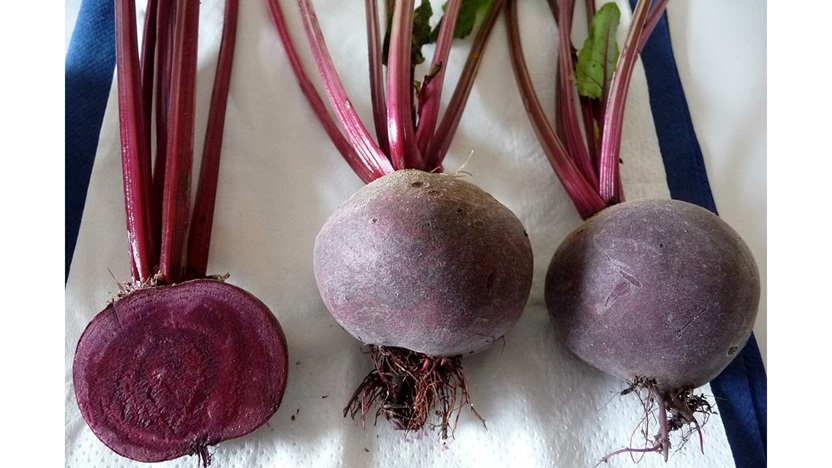.
To a Beet
I sing the bristled hedgehog grain
no horticulture can explain,
with six sly seedlings in its brain:
__the unborn beet.
That hook-and-hollow hydra seed,
a spiny knell to nascent weeds;
nor leaf nor rootlet can impede
__those fuchsia feet.
I sing the painted plum-wine sprouts
that spring aloft—as one, no doubt—
outrageous rings that blaze about
__the clay-specked sand.
A troop of chipper, chard-dark throats,
they bravely war with wind—and note
their dogged dances as they float
__through breezes; and
wag back anew to roundel tight,
leaves paddling at the dusty light.
Half-dozen sons of even height,
__five count their days.
I sing the gore-pink joint of stem
whose brothers live not to condemn
—the sun is stronger without them!—
__They parted ways
when silver scissor laid them low;
a flash, and in a latticed row
the shorn stems shrivel stiff and, O!
__but one head rears.
Now drooping greens spread scarlet ribs
to fan its leaflets; broad as bibs,
they sway and shade the newborn nibs
__that cock their ears
in crinkled green, with glossy spike,
betwixt the stem-joints; for they like
to sponge the streamlets ’neath the dike
__of leather roots.
And soon, their shepherd shade outgrown,
their narrow pates by zephyrs blown,
they crane their backs and carve their own
__new fuchsia flutes.
I sing the stenciled seal-gray toe
that swells its slaty heart below,
supporting stems it scarcely knows
__for slumber sound
in soft manure, bramble-black,
no eyes to guard its bristling back.
Too fat a globe it grows—alack!—
__and leaves the ground
with ruthless tear, from throat to tail—
into the sun the anchor sails,
and breaded soil, like crumbs of shale,
__clots still the root.
I sing the glistering blade that chops—
peel, tail, and stem for swinish slop,
and slats of root to cast atop
__the silver chute
where cream and beef, in slices flat,
their broiling bed adrift in fat,
snap and spit with every pat
__of beet that boils.
I sing the sowing then, instead,
of tiny slice of scarlet head,
packed deep within the belly’s bed
__—soft lard its soil.
The fallen sons of hydra birth
who skyward slant in mauve-stemmed mirth,
drive wind or rain, who ring the earth
__with ruddy wreath:
I sing their tub’rous sacrifice
who gave their blood to eat with rice
(That one sly seedling might suffice
__to stain our teeth!)
.
.
Kensley Greene is a student at the University of Florida.




Wow! That is an amazing poem about beets with such creative details about their growth and edibility. You have a fantastic command of the English language and employ it admirably. My mother used to pickle beets and I loved them.
A lot to like about this poem, like my fave line, ‘The fallen sons of hydra birth / who skyward slant in mauve-stemmed mirth’ and that superb final stanza.
I never ate beetroot as a child because of that staining effect. Where I teach now, beetroot is one of the staple veggies, and I’ve got to like (not love!) it.
Thanks for the read, Kensley.
The beets are such a fabulous rhythm.
When I read the title of this poem, my first reaction was “Oh, no… another nature-loving absurdity.” But reading the entire piece was not just delightful — it blew my mind! The absolute command of language and rhetorical skill in someone who is a young student was totally unexpected, and very gratifying. The poem is long, but not one of the interlinked quatrains disappoints.
It shows that any subject at all, even the most mundane, can be treated with fictive mimesis. And thank God, there is not one of the three miseries (meaning, message, and moral) in it.
I loved this clever poem and I love beets. Just planted some in the garden.
Thank you Kensley.
To me, this sounds like a poem by someone who has never actually tried to grow beets. The purple stain is true to life, but the rest of it is uninformed whimsy. And there was no mention of the nitric oxide production that might be the most important benefit of eating beet root. Oh well ….
C’mon, Kip — look at it as a poem, not a botanical report.
OK, Joseph. I think this poem is a middling example of the willful abandonment of verisimilitude. Nature has no need to imitate Art, but Art needs to know where it comes from.
Though I can’t eat beets I found the poem
delightful and imaginative. I love the energetic flow and color of its words. Thank you, Kelsey, I see a bright future for you as a wordsmith.
Thanks for this distinctive poem. It shows an impressive knowledge of the poet’s toolbox.
Beet poetry! Now there’s a novel thought. I love every juicy, joyous line of it. Thank you, Kensley!
Kelsey, you don’t call this “Ode to a Beet,” but you could have, because it is a marvelous and skillful burlesque ode. There are many features of the grandest of lyric forms: the high tone, the expansive diction, the classical allusions of “zephyr” and “hydra,” the elaborate form of paired stanzas with lines of different length rhymed aaab cccb, and the very length of the poem itself. Odes may seem easy to burlesque by choosing a humble subject and making grandiose fun of it, but you have to know what you’re doing, as you prove you do. Even the apparent carelessness about botanical accuracy fits the genre. Admirable produce from the poet’s kitchen garden!
I echo Margaret’s thoughts. This is a well-done burlesque ode, and you demonstrate a marvelous aptitude with your use of language, glorifying your humble subject with evocative description, allusion, and complex grammatical construction.
Great choice of subject, too. Root vegetables are the “humblest” of them all, buried in the dirt. But they are some of the tastiest, and in pre-industrial times were vital, as they sustained most families through winter.
Excellent work.